The Impact of Sleep Deprivation on Mental Health
Understanding the Critical Link Between Sleep and Mental Well-Being

The Vital Role of Sleep in Mental Health Maintenance
Sleep is a fundamental biological process that profoundly influences mental health. Its importance extends beyond physical recovery, impacting emotional regulation, cognitive functions, and resilience against psychological disorders. In this article, we explore how sleep deprivation poses a significant threat to mental stability and well-being, backed by scientific research and clinical findings.
Why Sleep Is Essential for Mental Health
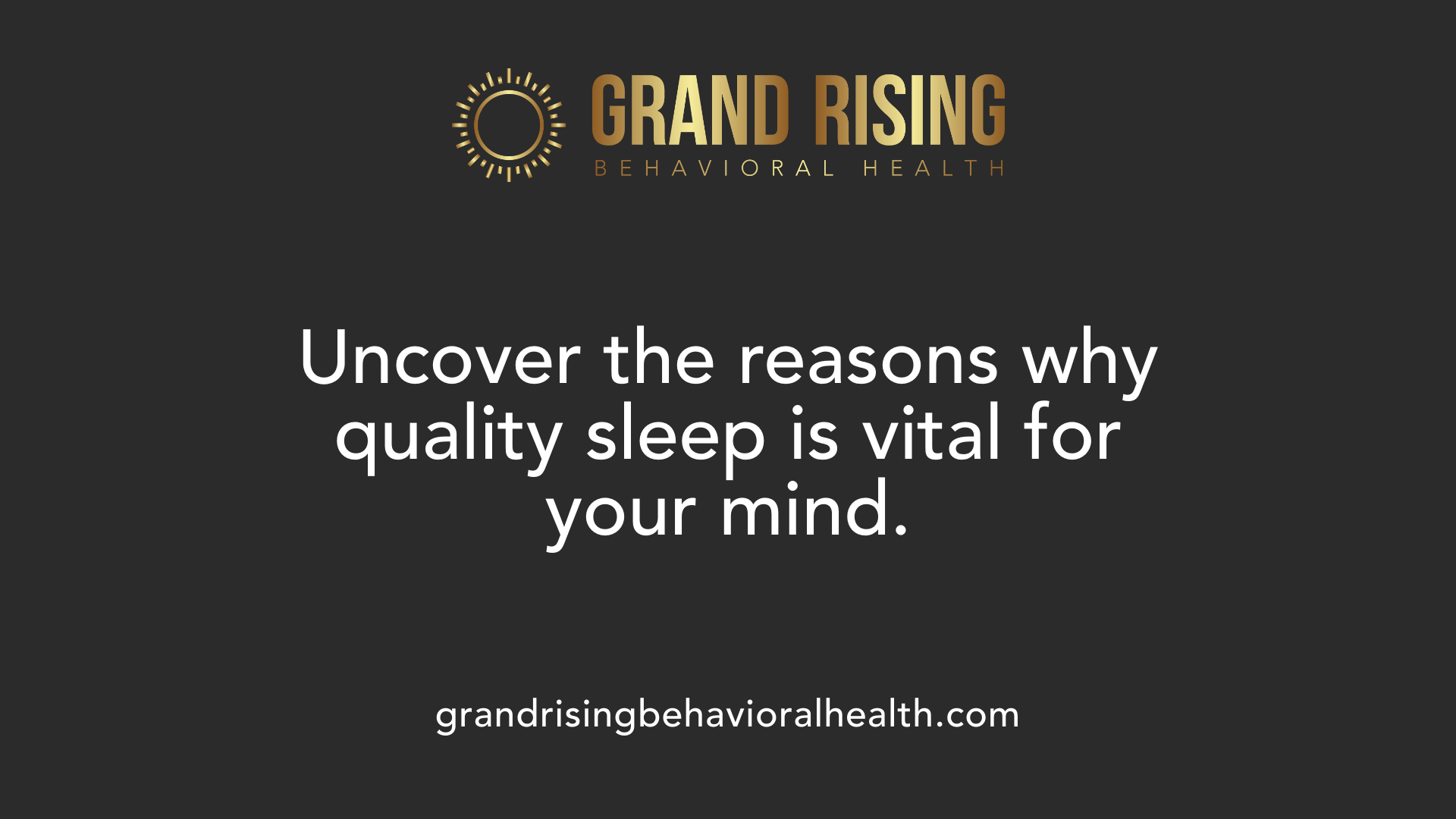
How does sleep influence emotional regulation?
Sleep plays a vital role in supporting emotional stability. When individuals don't get enough sleep, their brain's ability to process emotions is impaired. This can lead to increased irritability, anxiety, and mood swings. Research shows that sleep deprivation heightens activity in areas like the amygdala, which is involved in emotional responses, while reducing connectivity with the prefrontal cortex, which helps regulate emotions. As a result, sleep-deprived individuals may experience heightened emotional reactivity and difficulty managing stress.
What is the impact of sleep on cognitive functions such as attention and memory?
Adequate sleep is crucial for cognitive processes, including attention, learning, and memory formation. Sleep deficiency has been linked to impaired concentration, slower reaction times, and difficulty with problem-solving. It diminishes the brain's ability to consolidate memories and affects brain regions like the hippocampus and prefrontal cortex. Children and teens with insufficient sleep often show problems with focus and academic performance, and in adults, chronic sleep deprivation can accelerate cognitive decline.
How does sleep affect stress management and resilience?
Sleep acts as a reset for the brain, helping to process stress and repair emotional damage. When sleep is inadequate, the body’s stress response becomes hyperactive, leading to increased levels of stress hormones like cortisol. This makes it harder to cope with daily stressors and can contribute to anxiety and depression. Consistently poor sleep intake weakens resilience, making individuals more vulnerable to mental health disorders.
Why is sleep important for processing emotions and memories?
During sleep, especially REM sleep, the brain actively processes emotional information and consolidates memories. Sleep facilitates the weakening of emotional responses to traumatic memories, aiding in emotional regulation. Disrupted or insufficient sleep hampers these processes, leading to difficulties in coping with emotional events and increasing vulnerability to conditions like PTSD and depression.
What is the impact of sleep problems on psychiatric conditions?
Sleep issues are both symptoms and contributors to psychiatric disorders such as depression, bipolar disorder, anxiety, and schizophrenia. For example, insomnia is present in approximately 75% of depression cases and can increase the risk of developing major depression. Conversely, mental health conditions often cause sleep disturbances, creating a vicious cycle. Addressing sleep problems through therapy or behavioral interventions can significantly improve mental health outcomes.
| Aspect | Impact of Sleep | Consequences of Poor Sleep | Strategies for Improvement |
|---|---|---|---|
| Emotional Regulation | Enhances stability, reduces reactivity | Increased irritability, anxiety, mood swings | Sleep hygiene, cognitive-behavioral therapy for insomnia (CBT-I) |
| Cognitive Function | Supports attention, learning, memory | Impaired focus, forgetfulness, slow reactions | Regular sleep schedule, minimizing screen time before bed |
| Stress Management | Facilitates stress processing | Elevated cortisol, reduced coping capacity | Mindfulness, relaxation routines, stress reduction techniques |
| Emotional and Memory Processing | Helps in emotional adaptation | Difficulties in emotional regulation, PTSD symptoms | Adequate sleep, managing sleep environment |
Understanding the relationship between sleep and mental health highlights how essential restful sleep is for our emotional and cognitive well-being. Strategies to improve sleep can be an effective part of mental health treatment, offering both immediate and long-term benefits.
The Interplay Between Sleep Duration and Mental Well-Being
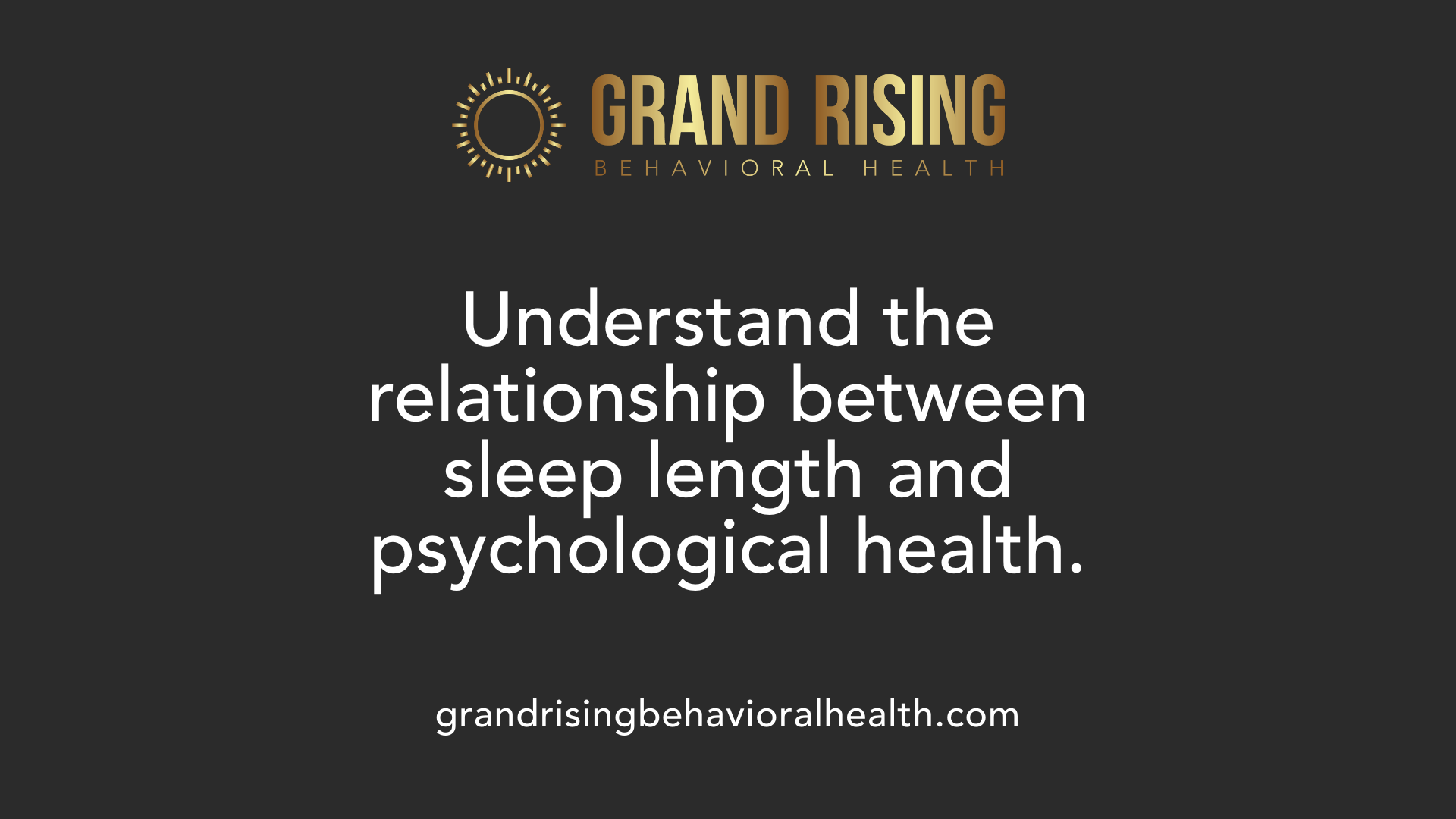
What is the relationship between sleep duration and mental well-being?
Research shows a complex, U-shaped link between how much sleep people get and their mental health. Both too little and too much sleep are tied to higher risks of mental health issues.
Most adults benefit from sleeping about 7 to 9 hours each night, which supports emotional balance and reduces chances of depression, anxiety, and stress. When sleep is shorter than this—especially less than 6 or 7 hours—risks for mental disorders rise significantly. For instance, adults sleeping 6 hours or less are over 2.5 times more likely to report frequent mental distress.
Conversely, sleeping more than 9 hours can also be associated with health concerns, although the link isn’t as strong as with short sleep. This pattern underscores how important it is to maintain an adequate sleep schedule.
Risks of short and long sleep
Short sleep durations, particularly under 6-7 hours, are linked to greater instances of depression, anxiety, and emotional regulation problems.
Long sleep durations, over 9 hours, sometimes correlate with health issues, but their connection to mental health is less clear and often influenced by underlying conditions.
In sum, consistently getting the right amount of sleep plays a critical role in safeguarding mental health.
Sleep disparities among different groups
Sleep patterns are not uniform across populations. Racial and ethnic minority groups often face disparities in sleep duration and quality, influenced by social, economic, and environmental factors.
These disparities can exacerbate existing health inequities, making it important to address social determinants that impact sleep and mental health.
Influence of social factors
Social factors including work schedules, family responsibilities, and cultural attitudes greatly influence sleep habits. For example, early school start times often cut into adolescents' sleep, increasing their vulnerability to mental health issues.
Furthermore, stressful life circumstances, social media use, and workload outside of school or work can decrease sleep duration and quality, further heightening mental health risks.
Understanding and addressing these social influences are essential for promoting healthier sleep habits and improving psychological well-being across diverse communities.
Symptoms and Mental Health Risks Linked to Sleep Deprivation
What are the mental health symptoms associated with sleep deprivation?
Sleep deprivation is strongly connected to various psychological and emotional symptoms. Individuals experiencing insufficient sleep often report increased irritability and mood swings, making it harder to manage daily stress.
Anxiety levels tend to rise, manifesting as rapid heartbeat, worry, and physical tension. Chronic lack of sleep disrupts emotional regulation, reducing the ability to cope effectively with stress and emotional challenges.
Depression is a common consequence, with sleep problems both contributing to and resulting from depressive states. Sleep deprivation increases the risk of developing suicidal thoughts due to feelings of hopelessness and emotional exhaustion.
In addition to these symptoms, impaired judgment, poor decision-making, and hallucinations may occur with prolonged sleep loss. These mental health issues are not only immediate but can also exacerbate existing psychiatric conditions, creating a vicious cycle.
Overall, insufficient sleep significantly hampers mental well-being. It amplifies emotional reactivity, increases stress responses, and heightens vulnerability to mental health disorders, emphasizing the importance of adequate sleep for emotional stability and psychological health.
Effects of Sleep Deprivation on Brain Function and Emotional Regulation
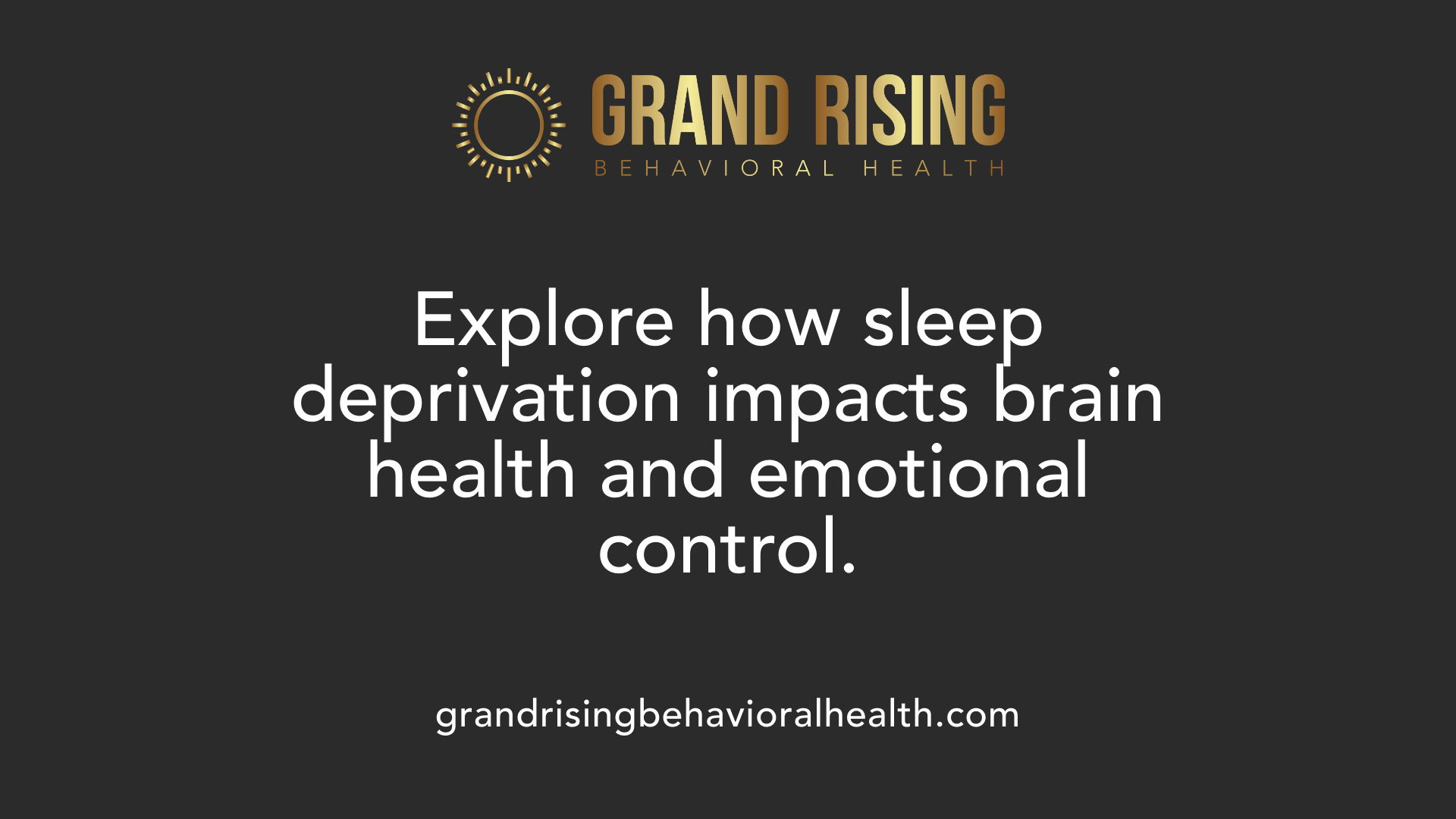
What scientific research has been conducted on the effects of lack of sleep on brain function?
Extensive scientific studies have confirmed that sleep deprivation significantly impairs how the brain functions. Research using neuroimaging techniques, such as fMRI scans, has shown that when individuals don't get enough sleep, there is a notable decrease in activity in critical brain areas responsible for cognitive processes, including the prefrontal cortex and hippocampus. These regions are essential for attention, working memory, and decision-making.
Moreover, lack of sleep disrupts the connectivity between different brain regions. For example, it weakens the links between the prefrontal cortex and the amygdala, leading to heightened emotional responses and poorer emotional regulation. This disconnect can cause individuals to react more intensely to negative stimuli and struggle with emotional control.
Research also highlights that sleep loss affects reward processing systems housed in regions like the striatum and limbic system. These changes may contribute to increased risk-taking and impulsivity. On a molecular level, deficiencies in proteins such as PTN, as well as alterations in neurotransmitters like adenosine and dopamine, have been implicated in neuronal damage and cognitive decline.
Population studies further support these findings, showing that both short sleep durations—less than 7 hours—and excessive sleep—more than 9 hours—are linked to signs of poorer brain health. These include white matter hyperintensities and decreased white matter integrity, which are markers associated with aging and potential neurodegenerative diseases.
Overall, the accumulated evidence underscores that inadequate sleep not only hampers immediate cognitive and emotional functions but also poses long-term risks for brain health and the development of neurodegenerative conditions. Maintaining proper sleep is crucial for functional brain activity, emotional stability, and overall mental health.
Impact of Sleep Deprivation on Emotional Regulation and Mood Stability
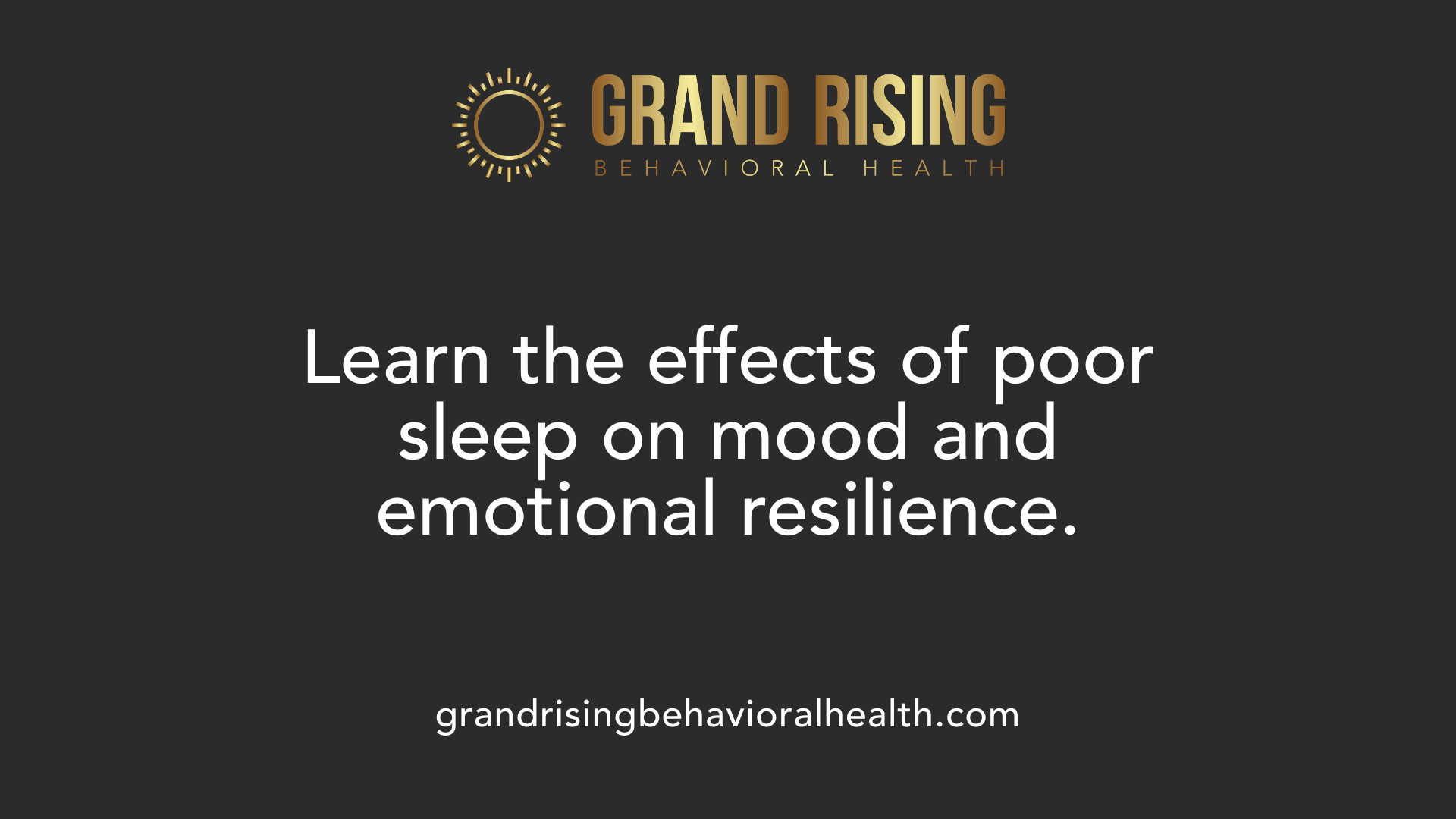
How does sleep deprivation impact emotional regulation and mood stability?
Sleep deprivation has a profound effect on the brain's ability to regulate emotions effectively. When individuals do not get enough sleep, particularly in terms of REM sleep, their emotional responses become more intense and less controlled. This is largely due to shifts in brain activity involving the amygdala and prefrontal cortex.
The amygdala, which is responsible for processing emotional reactions, becomes overactive during periods of sleep loss. This overactivation leads to amplified negative emotional responses, such as irritability, fear, and anxiety. Conversely, the prefrontal cortex, which helps regulate emotions and inhibit inappropriate responses, shows decreased activity when sleep is insufficient. This reduction impairs emotional control, making it harder to manage stress and negative feelings.
As a result, individuals experiencing sleep deprivation tend to exhibit increased irritability, mood swings, and impulsivity. They may also find it more challenging to cope with stress, leading to heightened emotional distress. The disruption in the balance between the amygdala and prefrontal cortex impairs emotional resilience and enhances vulnerability to mental health problems such as depression.
Research indicates that REM sleep is especially important in processing emotional memories and diminishing their emotional intensity. Lack of sufficient REM sleep hampers this process, leading to persistent emotional distress and difficulty in recovering from stressors.
In summary, sleep deprivation destabilizes mood by overactivating the brain regions involved in negative emotion processing while failing to engage the areas responsible for emotional regulation. Maintaining adequate sleep, therefore, is crucial for emotional stability and mental health.
More Information Search Query
For further details, search using the phrase "Sleep deprivation and emotional regulation."
Strategies to Counteract the Mental Health Effects of Sleep Loss
What are effective strategies to mitigate the mental health impact of sleep deprivation?
Addressing the mental health challenges caused by poor sleep requires a multifaceted approach. Consistent sleep schedules are fundamental; going to bed and waking up at the same time each day helps regulate your circadian rhythm and enhances sleep quality.
Practicing good sleep hygiene is also crucial. This includes creating a relaxing sleep environment—cool, dark, and quiet—using comfortable bedding, and avoiding screens (phones, computers, TV) at least an hour before bedtime to reduce blue light exposure that can disrupt melatonin production.
Establishing a calming bedtime routine, such as reading, taking a warm bath, or practicing relaxation techniques like deep breathing or meditation, can signal your body that it’s time to wind down.
Incorporating regular physical activity during the day improves sleep quality and helps reduce stress, but avoid vigorous exercise close to bedtime.
Managing stress through mindfulness, meditation, or yoga helps reduce anxiety that can interfere with sleep. Furthermore, avoiding stimulants like caffeine, nicotine, and alcohol in the hours before sleep minimizes sleep disruptions.
For persistent problems, addressing underlying health or work-related issues with medical guidance is advisable. Conditions like sleep apnea or chronic insomnia may require specialized treatment.
Seeking professional support, such as therapy or medical evaluation, can help develop personalized strategies and treat potential underlying mental health issues. Cognitive-behavioral therapy for insomnia (CBT-I) is particularly effective.
Prioritize getting between 7-9 hours of high-quality sleep per night. Adequate sleep is vital for emotional regulation, cognitive functions like attention and decision-making, and overall mental health. Combining these strategies can significantly reduce the adverse effects of sleep deprivation and foster mental resilience.
The Scientific Basis of Sleep’s Role in Mental Health
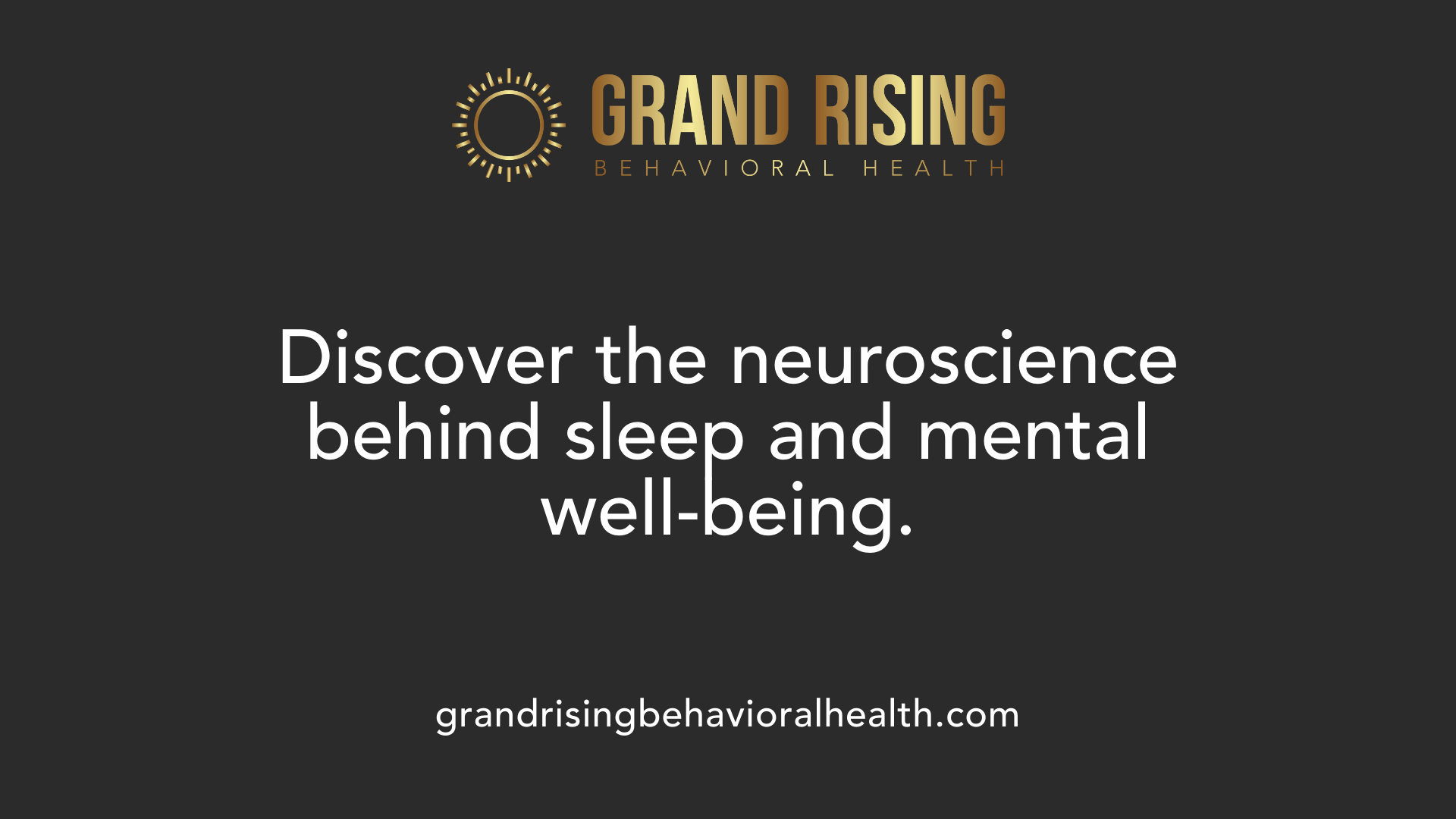
How does poor sleep contribute to mental health disorders from a scientific perspective?
Sleep is vital for maintaining emotional stability and proper brain function. Scientific research shows that inadequate sleep disrupts key brain areas involved in emotional regulation, particularly the amygdala and prefrontal cortex. This disruption leads to heightened negative emotional responses, such as increased anxiety and irritability, and decreases positive feelings like happiness and contentment.
Sleep is also crucial for processing emotional experiences. During sleep, especially REM sleep, the brain consolidates memories and modulates emotions, helping individuals cope with stress. When sleep is insufficient, this process becomes impaired, resulting in difficulty managing emotions, cognitive lapses, and mood swings.
Chronic sleep problems, such as insomnia and sleep apnea, are linked to the development and worsening of mental health conditions like depression, anxiety, bipolar disorder, and PTSD. These disorders often have a bidirectional relationship with sleep; poor sleep can be both a symptom and a contributing factor. For example, many with depression experience insomnia, which can further deepen depressive symptoms.
Neurologically, sleep deprivation affects neurotransmitter systems—particularly serotonin and dopamine—that regulate mood and motivation. It also influences hormonal balance, including stress hormones like cortisol, which can prove damaging when chronically elevated.
Furthermore, persistent sleep deprivation triggers inflammatory responses and compromises immune function, increasing vulnerability to mental and physical illnesses. Evidence suggests that improving sleep quality through behavioral therapies, such as cognitive-behavioral therapy for insomnia (CBT-I), and addressing underlying sleep disorders can significantly bolster mental health. By restoring sleep, individuals can improve emotional regulation, reduce stress levels, and break the cycle of mental health deterioration associated with sleep disturbances.
In essence, sleep’s influence on mental health is rooted in its fundamental role in neurobiological processes that govern emotion, cognition, and hormonal health, making it a critical target for intervention and prevention of psychiatric conditions.
Prioritizing Sleep for Mental Health Preservation
In conclusion, the evidence underscores the critical importance of sufficient, high-quality sleep in safeguarding mental health. Sleep deprivation not only heightens the risk of developing psychiatric conditions but also worsens existing mental health issues by disrupting emotional regulation, impairing cognitive functions, and altering neurochemical pathways. Addressing sleep problems through behavioral strategies, medical interventions, and lifestyle modifications is essential for promoting emotional stability and psychological resilience. As research continues to deepen our understanding of sleep’s neurobiological mechanisms, public health initiatives should emphasize sleep hygiene and education as vital components of mental health promotion. Prioritizing restful sleep will ultimately foster better overall well-being and reduce the societal burden of mental health disorders.
References
- How Sleep Deprivation Impacts Mental Health
- Sleep Deprivation and Deficiency - How Sleep Affects Your Health
- Effect of Inadequate Sleep on Frequent Mental Distress - CDC
- Sleep deprivation makes us less happy, more anxious
- Mental Health and Sleep - Sleep Foundation
- Effects of sleep deprivation on the mental health of adolescents
- The Connection Between Not Getting Enough Sleep and Mental ...
- Effects of Sleep Deprivation on Physical and Mental Health Outcomes
More Resources
A team ready to start your journey.
Get in touch — today.
We are a safe space – a haven for exceptional individuals to receive discreet, personalized, in-person treatment and care.
.avif)










